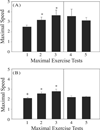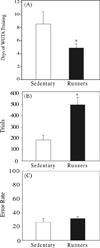Effects of aerobic exercise training on cognitive function and cortical vascularity in monkeys
- PMID: 20211699
- PMCID: PMC3417752
- DOI: 10.1016/j.neuroscience.2010.03.003
Effects of aerobic exercise training on cognitive function and cortical vascularity in monkeys
Abstract
This study examined whether regular exercise training, at a level that would be recommended for middle-aged people interested in improving fitness could lead to improved cognitive performance and increased blood flow to the brain in another primate species. Adult female cynomolgus monkeys were trained to run on treadmills for 1 h a day, 5 days a week, for a 5 month period (n=16; 1.9+/-0.4 miles/day). A sedentary control group sat daily on immobile treadmills (n=8). Half of the runners had an additional sedentary period for 3 months at the end of the exercise period (n=8). In all groups, half of the monkeys were middle-aged (10-12 years old) and half were more mature (15-17 years old). Starting the fifth week of exercise training, monkeys underwent cognitive testing using the Wisconsin General Testing Apparatus (WGTA). Regardless of age, the exercising group learned to use the WGTA significantly faster (4.6+/-3.4 days) compared to controls (8.3+/-4.8 days; P=0.05). At the end of 5 months of running monkeys showed increased fitness, and the vascular volume fraction in the motor cortex in mature adult running monkeys was increased significantly compared to controls (P=0.029). However, increased vascular volume did not remain apparent after a 3-month sedentary period. These findings indicate that the level of exercise associated with improved fitness in middle-aged humans is sufficient to increase both the rate of learning and blood flow to the cerebral cortex, at least during the period of regular exercise.
Copyright 2010 IBRO. Published by Elsevier Ltd. All rights reserved.
Figures






References
-
- Abernethy WB, Bell MA, Morris M, Moody Microvascular density of the human paraventricular nucleus decreases with aging but not hypertension. Exp Neurol. 1993;121:270–274. - PubMed
-
- Anderson BJ, Rapp DN, Baek DH, McCloskey DP, Coburn-Litvak PS, Robinson JK. Exercise influences spatial learning in the radial arm maze. Physiol Behav. 2000;70:425–429. - PubMed
-
- Balady GJ, Weiner DA. Exercise testing for sports and the exercise prescription. Cardiol Clin. 1987;5:183–196. - PubMed
Publication types
MeSH terms
Grants and funding
LinkOut - more resources
Full Text Sources
Research Materials

